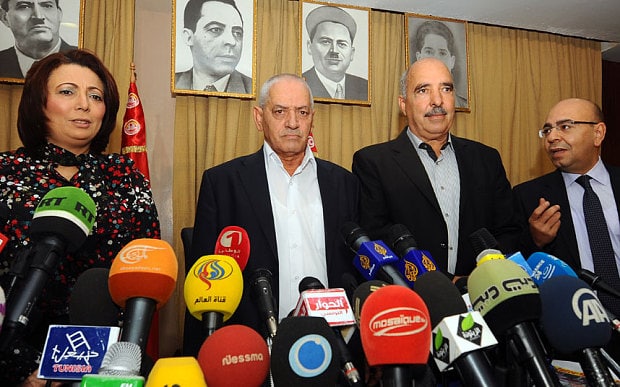The visit of a delegation from the Tunisian General Labor Union to Syria and their meeting with President Bashar al-Assad has caused bitterness among the civilians of the Syrian opposition, as this union has broad representative legitimacy and played a decisive role in the Tunisian revolution. Apart from the unethical dimensions of the trip, it raises questions about the Syrian regime’s position in non-religious circles, Arab and non-Arab.
In Tunisia, the Syrian regime has advanced in most leftist and secular circles, and in Turkey the nationalist and liberal opposition has been attracted to the non-religious “values of the Syrian regime.” The remnants of the Lebanese left, foremost the Communist Party, are allies of the regime in Syria, and Jordanian nationalists and leftists, rare as they are, maintain strong relations with the Syrian embassy in Amman.
However, the phenomenon has expanded to include European leftists as well, some of them with extensive representative qualities. The French leftist candidate who lost in the elections, Jean-Luc Melenchon, announced in his campaign platform his intention to correct French relations with the Assad regime, and this is also true to varying degrees with many leftist parties in member states of the European Union.
The left’s moral fall with its inclination toward a dictatorial regime that has used chemical weapons more than once has many reasons and sources. The Arab left, and nationalists alongside them, stood alongside Saddam Hussein in every trial and tribulation his regime encountered, and its position now is an extension of this mercenary position.
The European left’s stance is more complicated. It is not without its Orientalist and racist dimensions that do not see that the East is in need of the Western value of justice and the sensitivity around a murderous regime is not part of the values of the Arabs, east and west. Many correct explanations can be drawn from the visit of the Tunisian General Labor Union to Damascus and its meeting with officials soaked in Syrian blood. However, there is a moment which we — we who are surprised at the Labor Union's moral failure — must confront, reflected in the Muslim Brotherhood's responsibility for the presence of such unethical tendencies among a broad-based electorate. In Tunis, this is represented by the Islamic Ennahda (Renaissance) movement’s bias in Syria from the start, failing the revolution, while in Turkey the ruling Justice and Development (AK) Party’s sheltering and confiscating of the decisions of the Syrian opposition elite had an internal Turkish backlash. This is also true in Egypt to a large extent.
The Muslim Brotherhood in its various branches behaved in a way suggesting that the Syrian revolution was their child and that it was an extension of the “Brotherhood Spring,” and they opened their gates and borders for Salafis to slip into the rebelling Syrian cities, which was in line with the regime’s desire to transform the revolution into a civil war. Tunisia’s Ennahda did this, and the Turkish AK Party did this as well, while the Jordanian Brotherhood was encouraged to attack the king’s powers by their sense that the Brotherhood Spring had reached their neighbor Syria. This is what created the great state of panic in most of these countries, expressed in Tunisia through the defeat of Ennahda in elections and in Egypt with the revolution against the Brotherhood’s own revolution, and in Jordan with the imprisonment of the Brotherhood leadership who had expressed ambitions of a constitutional monarchy in which the king’s powers were marginalized.
No sooner had the Brotherhood Spring begun to fade when the Arab world’s blows began against the fractured revolution in Syria, which was in the process of turning into a war. Here the regime advanced in the awareness of the non-religious Arab elite and, in parallel, also in the levels of its violence. It bombed the Ghouta with chemicals, believing that the world’s fears of Islamic State (ISIS) gave it an opportunity to do so, and it seems that its calculations were correct. The Iranians revealed their direct and decisive role in the bloody events in Syria, and this fact strengthened the Islamist nerve alongside the opposition groups and made ISIS into an equal civil party.
These events were not distant from the internal events of countries such as Tunisia, Turkey, Egypt and Jordan. The Ennahda government experiment in Tunisia created the capabilities for Tunisia’s tendency toward Assad, as well as the AK Party in Turkey as well, and the short rule of the Brotherhood in Egypt revealed the Brotherhood’s avarice, facilitating the army’s assault on elections.
The Syrian bitterness generated by the Tunisian General Labor Union’s visit must move a step further in its amazement. The Muslim Brotherhood are responsible for this moral failure as well.
This article was translated and edited by The Syrian Observer. Responsibility for the information and views set out in this article lies entirely with the author.


